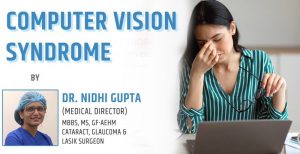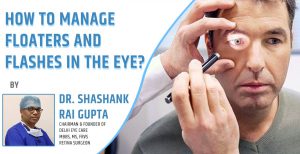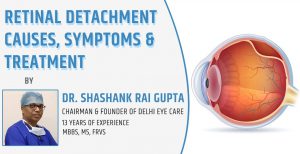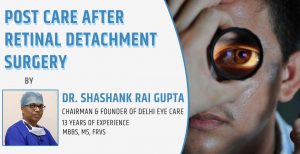
Blog Details
- Home
- Blog Details

Retinal Detachment
- August 12, 2021
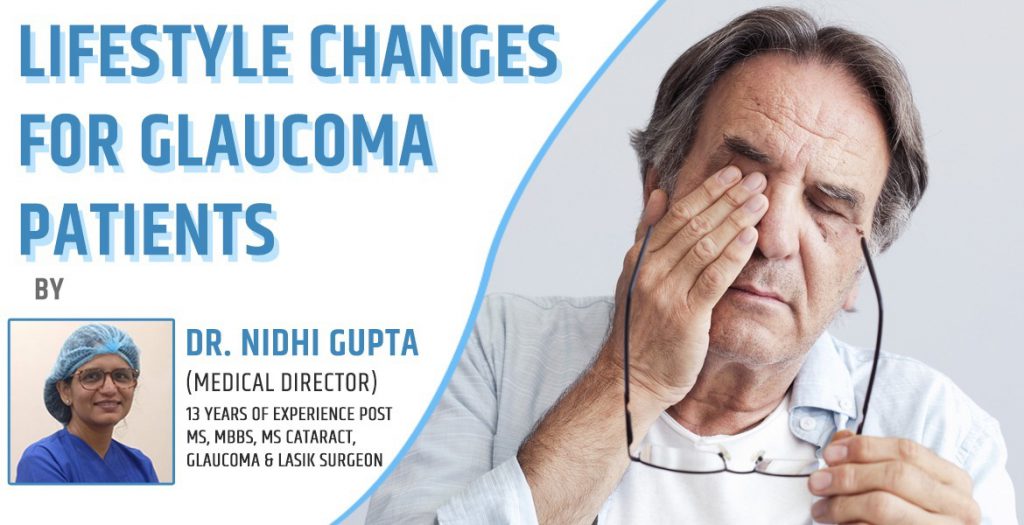
Old age brings with it so much distress in relation to physical health.
The outward signs with passing years advance at a fast rate. Some signs may be obvious; the prominent laughing lines, wrinkles. But, a few may be discrete, like heart disease, osteoporosis, drying of the vitreous of the eye.
Did you think we only start to see less or blurry with growing age with no reason behind it? Well, that is not the case.
The eyes constitute 80% of vitreous by volume, the gel-like substance. Because of its semi-solid nature, we retain the round shape of the eyes. Over time when the vitreous starts to detach from retina, sometimes leading to retinal tears or holes, thereby resulting in retinal detachment.
Another cause is when there is proliferation of tissue on the retina, which eventually displaces the retina out of its place by pulling it, especially in diabetics.
No matter what the cause is, retinal detachment is an emergency situation. The longer it is left untreated, the more risk it brings leading to blindness.
Symptoms of Retinal Detachment

Before the detachment, there is a retinal tear. If proper care is taken, early diagnosis can be made, which will prevent greater damage to the eye.
retinal detachment is painless in itself. But few of the signs to pay heed to are;
- Flashes of lights
- Blurred vision
- Reduced peripheral vision
- The appearance of many floaters; I.e., tiny specks that keep drifting in the vision field
- Sudden blackness.
Risk factors to Retinal Detachment
The following factors may enhance your chances of retinal detachment:
- It is common in people over 50 years of age
- Prior retinal detachment in other eye
- Rarely it can be hereditary
- Excessive Nearsightedness
- Any previous eye injury
- Any previous eye surgery
Diagnosis
The diagnosis is made when the patient anticipates any of the symptoms. Sometimes, the patient may discover his state at an advanced stage where the damage has already been done. So doctors always suggest staying vigilant to the minutest warning signals that are nothing close to normal. In scenarios where the damage has not occurred in the central part of the retina, the prognosis rate is better.
During the visit to the doctor, he will give you eye drops in order to dilate your eyes. Then special tools are used to view the condition of the retina.
Did you know:In advanced cases, even after the treatment, the return of eyesight may take place months after. And unfortunately, in the worst scenarios, the person may also lose his vision.
Therefore, an ophthalmologist should be rushed at the earliest to avoid the loss of eyesight. Retinal detachment cannot heal on its own, so proper care of your vision and an immediate visit to a doctor is what you can do from your side to prevent any mishaps.
Retinal Detachment Treatment
About 80%-90% of retinal detachment treatment is successful. Medical advancements have made retinal reattachment easy and feasible for all. The most successful procedure of all is surgical treatment.
- Vitrectomy - The liquified vitreous is removed and thereafter replaced with a gas bubble or silicon oil to retain the shape of the eyeball.
- Scleral bulking - To prevent the traction of the retina, an external silicon band is placed around the eye, thus tightening the retina to its place.
- Pneumatic retinopexy - A form of treatment where a gas bubble is injected into the eye to hold the retina in place. -
To ensure a quick healing process after retinopathy, make sure to follow a few guidelines;
- Use eye drops as prescribed by the doctor
- Maintain the positions of your head as told by Retina Surgeon
- Abstain from strenuous tasks until complete recovery
- Use eye guards to protect the eyes at least for a month
- Keep your hands clean so that no bacteria can reach up to your eyes. -
Prevention

Preventing advanced stages of retinal detachment can result in early recovery. Watch out for any red flags like the flashing light or the floaters.
Immediately visit your ophthalmologist in any abnormal conditions and go through periodic checkups if you are susceptible to any of the risk factors listed above.
Only you can give yourself the best care possible. Be it any age; your eyesight should be taken care of more than you take care of the world outside of you.

